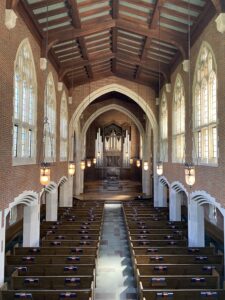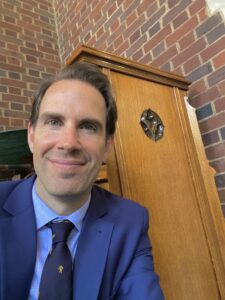Dustin Wood’s Class Visits Site of MLK Address

The Civil Rights Movement has been described as a religious phenomenon. Many of the Movement’s leaders were ministers, and many more people were inspired to participate in the Movement due to their religious beliefs. While religion motivated many individuals to join the struggle for civil rights, most churches were hesitant to support the Movement at an institutional level.
On April 25, 1957, Dr. Martin Luther King, Jr. addressed the Conference on Christian Faith and Human Relations co-hosted by Vanderbilt Divinity School and Scarritt College. In his speech, “The Role of the Church in Facing the Nation’s Chief Moral Dilemma,” King lamented that the Nation had “not learned the simple art of loving our neighbors, and respecting the dignity and worth of all human personality” and exhorted more than 300 church leaders to realize the Church’s obligation to address “the plague of racial conflict.”

“[E]very Christian,” King argued, “is confronted with the basic responsibility of working courageously for a non-segregated society. The task of conquering segregation is an inescapable must confronting the Christian Churches.” King’s speech directly rebuked those who desired distance between the Church and the Civil Rights Movement. “If we are to remain true to the gospel of Jesus Christ,” King urged, “we cannot rest until segregation and discrimination are banished from every area of American Life.”
Thanks to the hospitality of the Scarritt Bennett Center, Dr. Dustin Wood’s Rhetoric of U.S. Religion class had the pleasure of visiting the very space where King delivered his momentous message. Wood’s class gathered in historic Wightman Chapel to discuss King’s speech and entertain present-day applications of the address. As his students sat in the pews once occupied by King’s audience, Wood encouraged his class to reflect on the Reverend’s call to love one’s neighbors.